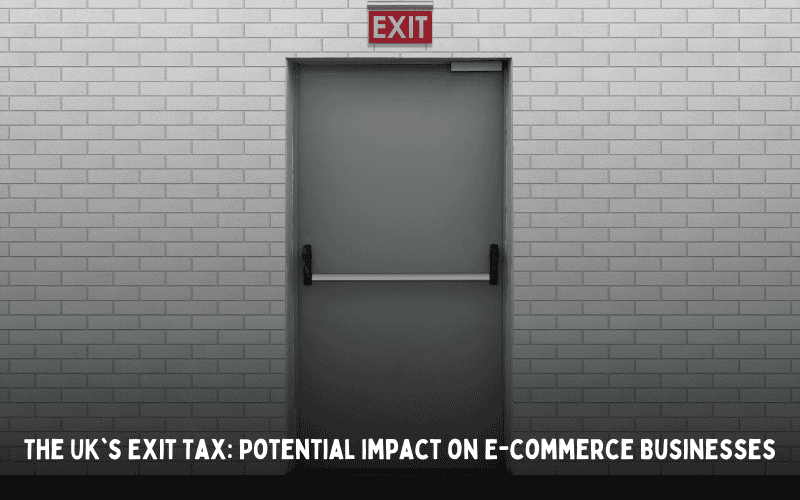The possibility of the UK introducing an exit tax has sparked widespread speculation, with the potential implications for wealthy individuals and businesses, including the burgeoning e-commerce sector, being of particular concern. While most of the discussions revolve around how this tax might affect high-net-worth individuals, it’s crucial to understand how e-commerce businesses could be impacted if such a policy is implemented.
What Is a UK Exit Tax?
An exit tax is designed to tax individuals or businesses when they move their tax residence out of the country. Countries like the United States, Canada, and Australia have implemented exit taxes to ensure that individuals pay taxes on the gains accrued while residing there before they leave.
In the UK, this tax could potentially impact wealthy individuals, but its ripple effects may reach businesses, especially those in the e-commerce sector, which has a substantial reliance on a globally mobile workforce and the flexibility of location-independent business models.
E-commerce and the Impact of an Exit Tax
E-commerce businesses in the UK, particularly those operating internationally, could face several challenges if an exit tax is introduced. Here’s a closer look at the potential consequences:
1. Business Owners Leaving the UK
E-commerce entrepreneurs often relocate to take advantage of favorable tax policies in other countries. With an exit tax in place, these individuals may be discouraged from moving their businesses abroad due to the financial burden associated with leaving the UK. For those who still opt to relocate, the tax may reduce the capital available for reinvesting in their business, innovation, or scaling efforts.
2. Loss of Investor Confidence
Many e-commerce businesses rely on funding from investors, including venture capitalists, private equity firms, and wealthy individuals. If the UK implements an exit tax, investors might become hesitant to back UK-based e-commerce businesses, especially if they believe the founders or key stakeholders may relocate. This could limit access to essential capital for e-commerce startups and growing businesses.
3. Impact on Talent Acquisition and Retention
The global nature of e-commerce means that talent often moves between countries. Skilled professionals, such as developers, marketers, and operations managers, may be less inclined to work in the UK if there is an exit tax that could affect their long-term financial planning. The e-commerce sector, which already faces challenges in attracting top tech talent, may struggle further to retain key staff.
4. Potential Decline in Consumer Spending
The introduction of an exit tax could trigger a broader exodus of wealthy individuals from the UK, reducing demand for high-end products and services. Many e-commerce businesses that cater to affluent customers could see a downturn in sales. Luxury goods, bespoke services, and niche markets may be hit hardest, leading to decreased revenue and lower profit margins.
5. Increased Compliance and Administrative Burden
E-commerce businesses, which often operate with lean structures to maximize profitability, may find themselves facing new administrative challenges if exit tax rules are extended to corporate entities or business structures. The need to navigate complex tax regulations, especially if ownership is shared by individuals residing in multiple countries, could divert valuable resources away from growth and innovation.
6. Effect on International Competitiveness
The e-commerce market is highly competitive, and UK-based businesses already face stiff competition from companies in Europe, the US, and Asia. If an exit tax is perceived as a barrier for business owners or investors, UK e-commerce companies may lose their edge. Entrepreneurs might choose to establish or relocate their businesses to more tax-friendly jurisdictions, weakening the UK’s standing as a hub for digital commerce.
Preparing for Potential Changes
While the introduction of an exit tax is still speculative, e-commerce businesses should take a proactive approach to mitigate potential risks:
- Assess Global Business Structures: If your business operates internationally or has plans to expand globally, now is the time to review your corporate structure. Make sure it is optimized for potential changes in UK tax policy.
- Retain Top Talent: Since talent mobility might be affected by an exit tax, consider offering competitive packages and flexible working arrangements to retain skilled employees.
- Secure Funding Early: If your business relies on external funding, it might be wise to secure investments now, before any tax changes are introduced. This ensures that your business has sufficient capital to weather any economic uncertainties.
- Monitor the Political Landscape: Stay informed about upcoming budget announcements, especially the Autumn Budget in October 2024. Understanding the political context will allow you to prepare for potential tax changes that could affect your business.
Conclusion
The potential introduction of an exit tax in the UK presents challenges not just for individuals but for the e-commerce sector as a whole. From reduced investor confidence to talent retention difficulties and possible declines in consumer spending, e-commerce businesses should be aware of the wide-ranging effects this tax could have on their operations. Taking proactive steps now can help ensure that your business is well-positioned to navigate the uncertainties that lie ahead.
Staying informed, adapting your business structure, and maintaining financial flexibility will be key to surviving and thriving in a post-exit tax economy.

